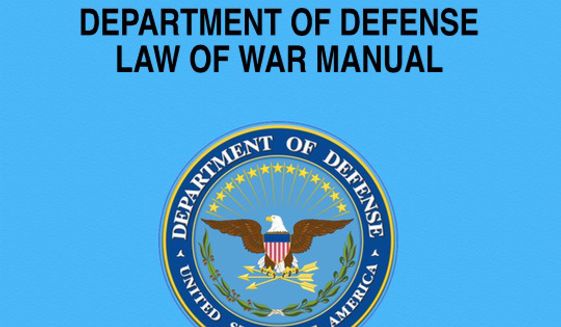The Pentagon’s new thick book of instructions for waging war the legal way says that terrorists also can be journalists.
The description appears in a 1,176-page, richly footnoted “Department of Defense Law of War Manual” that tells commanders the right and wrong way to kill the enemy. It says it’s OK to shoot, explode, bomb, stab or cut the enemy. Surprise attacks and killing retreating troops also are permitted. But a U.S. warrior may not use poison or asphyxiating gases.
Going back decades, this is the Pentagon’s first comprehensive, all-in-one legal guide for the four military branches, who over the years had issued their own law of war pamphlets for air, sea and ground warfare.
The manual pushes aside the George W. Bush-era label of “unlawful enemy combatant” for al Qaeda and the like. The new term of choice: “unprivileged belligerent.”
An eye-catching section deals with a definition of journalists and how they are expected to stay out of the fight.
The manual defines them this way: “In general, journalists are civilians. However, journalists may be members of the armed forces, persons authorized to accompany the armed forces, or unprivileged belligerents.”
Lumping terrorist writers with bona fide scribes prompted one officer to call the paragraph “odd.” A civilian lawyer who opines on war crime cases called the wording “an odd and provocative thing for them to write.”
Michael Rubin, a Middle East expert at the American Enterprise Institute, said the manual reflects today’s muddled world of journalism.
“It’s a realization that not everyone abides by the same standards we do,” said Mr. Rubin. “Just as Hamas uses United Nations schools as weapons depots and Iran uses charity workers for surveillance, many terrorist groups use journalists as cover.”
Mr. Rubin recalled that two al Qaeda terrorists posed as journalists to assassinate anti-Taliban leader Ahmad Shah Massoud. Chechen Islamists went on missions with camera crews.
“Journalists are the new consultant. Anyone can claim to be one,” he said. “No American serviceman should ever be killed because a politician told them they had to take a foreign journalist at his or her word.”
Army Lt. Col. Joseph R. Sowers, a Pentagon spokesman, explained the reasoning behind the inclusion of “unprivileged belligerents” as journalists.
“We do not think that there is any legal significance to the manual listing unprivileged belligerents as sometimes being journalists because the manual does not, itself, create new law,” Col. Sowers said.
“That last sentence simply reflects that, in certain cases, persons who act as journalists may be members of the armed forces, persons authorized to accompany the armed forces or unprivileged belligerents rather than civilians. The fact that a person is a journalist does not prevent that person from becoming an unprivileged belligerent.”



No comments:
Post a Comment